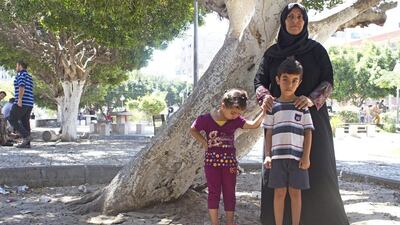GAZA CITY // For Fatima Syam, a quiet stroll through a park yesterday was a respite from the Israeli bombardments that have become an everyday routine for the past 17 days here.
She walked through Unknown Soldier park with her grandchildren, Rahaf, 3, and Ali, 4.
“They need to get out,” said, Mrs Syam, 47, referring to the nearby apartment that the children and dozens of other relatives have crammed into over the last week.
More than 100,000 Gazans have been displaced by the fighting that erupted on July 8, according to the United Nations. More than 750 Palestinians have been killed and more than 4,000 wounded.
The scenes in the park were surreal. As Israeli drones buzzed overhead like lawnmowers, dozens of children splashed in a fountain – the sound of their laughter out of place in the war zone around them.
Adults watched the children or hung laundry out to dry on railings separating the park from the street. The roar of Israeli fighter jets and the thud of shelling could be heard in the distance.
Moneer Al Ballawi, 32, sat on a bench, passing the time texting friends and breathing in the fresh air.
“It’s just nice to see children smiling again,” he said. “I haven’t seen a child smile in Gaza for a long time.”
Yet he too was unnerved by the situation. He was hoping that a nearby bank was dispensing cash, which he had not been able to withdraw since the war began.
There were long lines and people shouting in anger. He hesitated to join the fray.
“I want money. I am desperate for it. But those lines are too long,” he said.
With the Eid festival next week, this is usually a time of shopping for food and gifts, but “there’s no Eid for Gaza” this year, Mr Ballawi said. “There’s too much death and loss.”
Across town, things were worse. Yahia Hanadi Al Kafarna, 24, fled with her family from their home in the northern Gaza city of Beit Hanoun to a hospital in the area, then to an overcrowded UN-run school and then to an agricultural warehouse in Gaza City’s Rimal area.
Seventy people were staying the facility, which had neither a generator for electricity nor a shower, and just one toilet.
Dwindling fuel supplies and damage to the power grid from the fighting has left the city with just an hour or two of electricity a day.
“It’s intolerable here,” said Ms Al Kafarna said, adding that they were getting by on biscuits, pita bread and canned beans.
She had not seen her fiance, Ibrahim Fayyed, 27, since they fled their homes on Monday. He and his parents went to an apartment across the city.
They had planned to marry on August 13, but was unlikely now, Ms Al Kafarna said.
“We have to make it through this alive.”
Back in Unknown Soldier park, Mrs Syam also worried about her loved ones. She has not talked to her sons since they fled their homes along with other residents after heavy Israeli bombardment of the Zeitoun area in eastern Gaza City on Sunday. Their mobiles were not working, and she feared the worst.
“What can I do? I pray to God they are well, but I have to move forward,” she said.
Hamas’s leader-in-exile, Khaled Meshaal, on Wednesday said the group would not stop fighting Israel until the seven-year-long Israeli siege of the Gaza Strip was finally lifted.
His comments were echoed by Mrs Syam, who said a ceasefire with anything less would be surrender, a loss of dignity, a return to the misery that caused this bout of fighting to erupt in the first place.
“Let me ask you something: if foreign troops came to America and occupied it, would Americans fight?” she asked.
“Of course they would! We’re doing the same here. We can’t live in humiliation like this. We’d rather die with dignity than live under humiliation.”
hnaylor@thenational.ae

